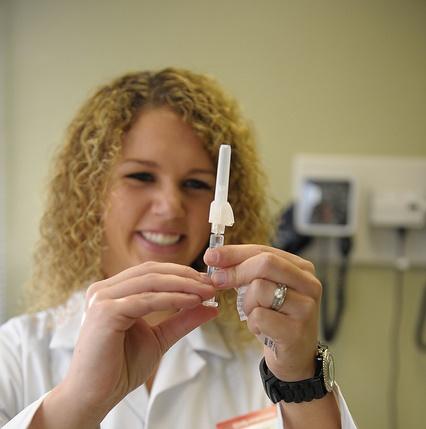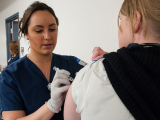A study published today in PLoS One suggests that vaccinating healthcare workers (HCWs) against influenza does little to protect their patients.
"If you are making something like flu vaccination mandatory, and enforcing it for healthcare workers, you need to demonstrate that the intervention is effective," said lead author Gaston De Serres, MD, PhD, a medical epidemiologist at the Institute National de Sante Publique du Quebec. "But we do not know what percentage of influenza cases can be reduced by vaccinating HCWs."
Revisiting the data
To conduct the study, De Serres and his colleagues reviewed four cluster randomized control trials of vaccinated HCW working in nursing homes and other long-term care facilities. The studies are often cited as positive evidence that mandating flu vaccination for HCWs reduces disease risk among patients. But by using the mathematical principle of dilution, De Serres showed that the reduction of risk is non-existent when applied to acute care settings, including hospitals.
"The four randomized controlled trials [RCTs] that these mandates and recommendations are based on offer no data that vaccinating workers protects patients," said De Serres. The main problem the authors found was that the trials had implausible results. For instance, one trial said that vaccinating eight HCWs would save one patient's life.
"If this conclusion were true, it would mean that vaccinating all hospital staff in Canada (or the United States) could prevent more deaths each year than occurred in either of those countries across their entire populations during the 1918 pandemic—the worst pandemic in history," the authors wrote in a summary of their study. "That conclusion is utterly impossible."
Instead, De Serres and his colleagues found that a more realistic recalibration based on actual patient data showed that 6,000 to 32,000 hospital workers would need to be vaccinated before a single patient death could potentially be prevented. That is a hefty and expensive intervention, he said.
Besides dilution, the four trials are prone to bias, De Serres said. Two of the trials didn't look at flu-specific outcomes, just influenza-like illnesses (ILI) and all-cause mortality. In long-term care settings, all-cause mortality contains very little influenza effect because life expectancy is less than 2 years, and 1% to 2% of the population dies every week.
"These RCTs increased the vaccine coverage among HCWs just a little, and the decrease in illness happened before the influenza kicked in," said De Serres.
In other words, De Serres explained that if a reduction of all-cause mortality was seen before flu started circulating, then something other than the vaccination of HCWs was at play. Though the new study doesn't offer an explanation, De Serres said it's easy enough to guess at a number of conflating factors.
"The HCWs were educated about illness before they got the vaccines," said De Serres. "Maybe they didn't come to work if they weren't feeling well."
Need for good science, better flu vaccine
Currently several US states and Canadian provinces have vaccinate-or-mask policies, which stipulate HCW vaccination. And those policies stand despite the understanding of many flu experts that HCW vaccination does very little to decrease influenza burden in patients.
"De Serres's study is the first that shows the implausibility of the numbers presented in these previous trials," said CIDRAP Director Michael Osterholm, PhD, MPH, director of the Center for Infectious Disease Research and Policy (CIDRAP) at the University of Minnesota, which publishes CIDRAP News.
"We have to make public health recommendations based on good science," Osterholm added, "but we do not have the justification to take punitive action against healthcare workers if they don't get vaccinated.”
While this study is not the first to show the lack of protection for patients of vaccinating HCWs, most US doctors still recommend the practice.
"I recommend workers to get the vaccine for their own benefit," said Melanie Swift, MD, director of the occupational health clinic at Vanderbilt University. Swift said Cochrane reviews in 2010, 2013, and 2016—as well as a US Centers for Disease Control and Prevention review in 2013—likewise found little benefit for patients of HCW vaccination. Still, Swift said that vaccination, along with diligent hand washing and hygiene practices, is an important tool against influenza.
"It reduces the chance of getting the flu to 60%, so it's worth doing for most people,” Swift said. “But what this really does is point to the big elephant in the room. We need a better flu vaccine."
See also:
Jan 27 PLoS One study
Sep 19, 2013, CIDRAP News story "Analysis finds limited evidence for HCW flu vaccination"




















